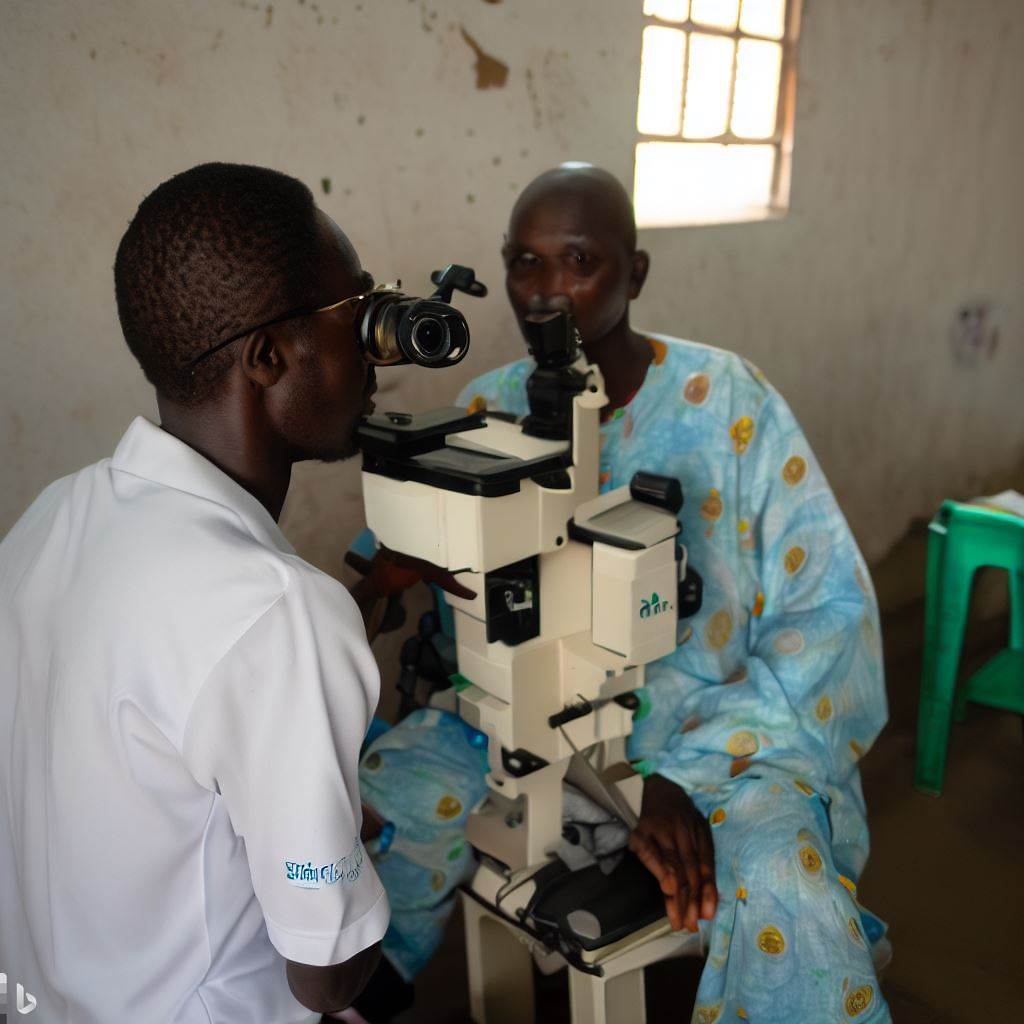Introduction
MRI technologists play a crucial role in the medical field by operating advanced imaging equipment to produce detailed images of the body’s internal structures.
This helps doctors diagnose and treat various medical conditions.
In Nigeria, there is an increasing demand for MRI technologists due to the growing importance of medical imaging in healthcare.
As more hospitals and clinics invest in MRI machines, the need for trained professionals to operate them has also grown.
To become an MRI technologist in Nigeria, there are specific steps and requirements to follow.
Firstly, one must obtain a degree or diploma in radiography from an accredited institution.
This provides the foundation for understanding medical imaging principles and techniques.
After completing the educational requirements, aspiring MRI technologists must then undergo specialized training in MRI technology.
This includes both classroom instruction and practical hands-on experience in operating MRI equipment.
Additionally, individuals interested in this field must obtain certification from a recognized professional organization, such as the Radiographers Registration Board of Nigeria (RRBN).
This certification ensures that MRI technologists meet the necessary standards of competence and professionalism.
Furthermore, it is crucial for MRI technologists to continuously update their knowledge and skills through ongoing professional development.
This may involve attending conferences, workshops, and seminars to stay up-to-date with the latest advancements in MRI technology and techniques.
In summary, MRI technologists play a vital role in the medical field, particularly in Nigeria where the demand for their expertise is increasing.
By following the necessary steps and requirements, individuals can pursue a rewarding career as MRI technologists and contribute to improving healthcare outcomes.
Education and Training
Becoming an MRI technologist in Nigeria requires a strong educational foundation.
Aspiring professionals should prioritize earning a bachelor’s degree in radiologic technology, which provides essential knowledge in radiography, anatomy, pathology, and patient care, laying the groundwork for specialization in MRI imaging.
Thankfully, Nigeria offers specialized MRI technologist programs, providing targeted training in MRI technology.
The curriculum includes theoretical and practical components, covering MRI machine principles, patient positioning, image acquisition, analysis, and radiation safety protocols.
Students also gain valuable insights into MRI-specific patient care, advanced imaging techniques, and relevant anatomy and physiology.
Clinical rotations and internships provide hands-on experience under experienced technologists’ guidance, preparing graduates for a rewarding career in hospitals, imaging centers, and research facilities.
With dedication to education and training, these professionals significantly contribute to the advancement of healthcare in Nigeria.
Read: Understanding the Salary Scale for Lab Technicians in Nigeria
Certification and Licensing
Obtaining certification and licensing are essential for MRI technologists in Nigeria.
These credentials demonstrate proficiency and expertise in the field and are crucial for career advancement and job opportunities.
Significance of Certification for MRI Technologists
- Certification validates the skills, knowledge, and competence of MRI technologists.
- It gives employers confidence in the abilities of the technologists they hire.
- Certification ensures that technologists stay updated with the latest advancements and best practices.
- It enhances professional credibility and recognition within the healthcare industry.
- Certified MRI technologists can demand higher salaries and enjoy better job prospects.
Specific Certification Exams Available in Nigeria
In Nigeria, MRI technologists can pursue the following certification exams:
- Registry Examination for Diagnostic Medical Sonographers (ARDMS)
- Magnetic Resonance Imaging Certification Board Exam (MRICB)
- Association of Medical Imaging Practitioners of Nigeria (AMIPN) certification
Professional Organizations Offering Certification for MRI Technologists
Several professional organizations in Nigeria offer certification for MRI technologists, including:
- Nigerian Institute of Radiography (NIR)
- West African College of Radiology (WACR)
- National Association of Nigerian Radiographers (NANR)
Licensing Requirements in Nigeria
In addition to certification, MRI technologists in Nigeria must fulfill certain licensing requirements:
- Hold a bachelor’s degree in medical radiography or a related field from a recognized institution.
- Complete a one-year internship in a registered teaching hospital.
- Possess a valid practice license issued by the Radiographers Registration Board of Nigeria (RRBN).
- Maintain continuing professional development by earning specified continuing education credits.
It is essential for MRI technologists in Nigeria to ensure that they meet the certification and licensing requirements to practice safely and legally in the field.
By obtaining certification and licensure, MRI technologists can showcase their expertise and professionalism, leading to better career prospects and increased job opportunities.
Read: Regulations Governing Prosthetist Practice in Nigeria
Clinical Experience
Obtaining clinical experience in MRI imaging centers is crucial for becoming a successful MRI technologist in Nigeria.
It allows trainees to apply their theoretical knowledge in a real-world setting and develop essential skills.
Importance of Gaining Hands-On Experience
- Enhances Understanding: Clinical experience provides a deeper understanding of MRI imaging techniques and procedures.
- Improves Patient Care: Interacting with patients during clinical training enhances communication skills and the ability to provide compassionate care.
- Develops Technical Skills: Trainees gain hands-on experience in operating MRI equipment and performing various imaging procedures.
- Builds Confidence: Practical exposure helps build confidence in handling complex cases and troubleshooting technical issues.
- Ensures Safety: Clinical experience emphasizes the importance of following safety protocols to ensure patient and staff well-being.
Process of Obtaining Clinical Experience as an MRI Technologist Trainee
Aspiring MRI technologists in Nigeria can gain clinical experience through trainee programs or internships:
- Enroll in a Training Program: Complete a recognized MRI technologist training program to gain theoretical knowledge.
- Apply for Trainee Positions: Seek opportunities to secure trainee positions in reputable MRI imaging centers.
- Hands-On Training: Undergo supervised clinical training, where trainees work alongside experienced technologists.
- Rotation of Job Roles: Trainees may rotate among different modalities and departments to gain comprehensive experience.
- Progressive Learning: Gradually take on more responsibilities as skills and knowledge improve.
Responsibilities and Skills Acquired During Clinical Training
During clinical training, MRI technologist trainees acquire numerous skills and responsibilities
- Equipment Operation: Trainees learn to operate and calibrate MRI scanners, ensuring optimal image quality.
- Patient Preparation: Understanding the process of patient positioning and preparing them for the imaging procedure.
- Image Acquisition: Trainees perform MRI scans following protocols and adjusting parameters for accurate images.
- Quality Control: Regularly check and maintain equipment, ensuring its functionality and safety standards.
- Documentation: Maintain accurate records of patient details, imaging protocols, and other relevant information.
- Communication: Develop effective communication skills to interact with patients and healthcare professionals.
Advantages of Completing an Internship or Residency Program
Completing an internship or residency program offers several advantages for aspiring MRI technologists:
- Structured Learning: Internship programs provide a structured curriculum to enhance learning and skill development.
- Networking Opportunities: Interacting with experienced professionals and peers boosts professional networking.
- Exposure to Advanced Technology: Internship programs often provide access to state-of-the-art MRI equipment and techniques.
- Professional References: Successful completion of an internship can lead to strong recommendations from mentors.
- Certification and Career Advancement: Internship programs can fulfill training requirements necessary for professional certification.
- Increased Employability: Having internship experience makes individuals more competitive in the job market.
By gaining hands-on clinical experience, MRI technologist trainees in Nigeria can acquire essential skills and knowledge, paving the way for a successful career in the field.
Read: Success Stories of Nigerian Orthotists and Prosthetists

Job Opportunities and Career Outlook
When it comes to job opportunities, MRI technologists in Nigeria have a promising future ahead.
Employment Prospects
The demand for MRI technologists is expected to grow steadily in Nigeria.
With the increasing prevalence of chronic diseases and a growing aging population, there is a higher demand for diagnostic imaging procedures.
MRI technologists play a crucial role in obtaining high-quality images for accurate diagnoses.
As a result, the employment prospects for MRI technologists in Nigeria are projected to be favorable in the coming years.
Varied Settings
MRI technologists have the flexibility to work in various healthcare settings.
- Hospitals: Most MRI technologists in Nigeria find employment in hospitals, where they work closely with radiologists and other healthcare professionals.
- Clinics: MRI technologists also have opportunities to work in outpatient clinics, performing imaging exams for patients in a less acute setting.
- Research Centers: Some MRI technologists choose to work in research centers, assisting in clinical trials and research studies.
Growth Potential and Advancement Opportunities
The field of MRI technology in Nigeria offers potential for growth and advancement.
With experience and additional certifications, MRI technologists can specialize in specific areas such as cardiac imaging or neuroimaging.
They can also take on leadership roles, such as becoming a chief technologist or department supervisor.
Moreover, as technology advances, new opportunities for specialization and career advancement are expected to arise.
Average Salary Range
The average salary range for MRI technologists in Nigeria varies depending on factors such as experience, level of specialization, and the location of employment.
Entry-level MRI technologists can expect to earn a salary ranging from ₦500,000 to ₦800,000 annually.
With several years of experience and expertise, MRI technologists can earn up to ₦1,500,000 or more per annum.
Furthermore, additional certifications and advanced degrees can significantly increase earning potential.
Overall, the job outlook for MRI technologists in Nigeria is bright, with a steady increase in demand and opportunities for growth in this healthcare profession.
Read: Nigeria’s Orthotics and Prosthetics: Historical Overview
Continuing Education and Professional Development
The need for continuous learning and staying updated in the field
Continuous learning is essential for becoming a successful MRI technologist in Nigeria.
The field of MRI technology is constantly evolving, and new techniques and equipment are constantly being developed.
As such, it is crucial for MRI technologists to stay updated and continuously expand their knowledge and skills.
To ensure continuous learning, MRI technologists should take advantage of various opportunities for professional development.
These opportunities include attending workshops, conferences, and webinars, which provide valuable insights into the latest trends and advancements in the field.
By participating in these events, MRI technologists can enhance their understanding of MRI technology and gain exposure to innovative practices.
The Different Opportunities for Professional Development
Workshops, conferences, and webinars are effective means of professional development for MRI technologists in Nigeria.
Workshops offer hands-on training and allow technologists to practice new techniques in a controlled environment.
Conferences provide a platform for learning from renowned experts through lectures, presentations, and panel discussions.
Webinars offer flexibility, as they can be accessed online, allowing technologists to learn at their own pace.
Benefits of Pursuing Advanced Certifications or Higher Education Degrees
Advanced certifications and higher education degrees can significantly enhance career prospects for MRI technologists in Nigeria.
These credentials demonstrate a higher level of expertise and dedication to the field, which can lead to increased job opportunities and higher salaries.
MRI technologists can pursue certifications such as the Certified MRI Technologist (CRMT) or Magnetic Resonance Imaging Technologist (MRIT), which are recognized by professional organizations.
Higher education degrees, such as a Bachelor’s or Master’s degree in MRI technology or a related field, can provide a deeper understanding of the principles and practices in MRI imaging.
These degrees also open doors to advanced positions in research, teaching, or management within the field of MRI technology.
Encouraging Networking and Joining Professional Associations
Networking plays a vital role in the professional development of MRI technologists in Nigeria.
By building connections with other MRI professionals, technologists can exchange knowledge, share experiences, and stay updated on the latest developments.
Joining professional associations, such as the Nigerian Association of Radiographers and Radiological Technologists (NARRT), provides access to a network of professionals and resources.
Professional associations offer numerous benefits, including opportunities to attend conferences, access to industry publications, and participation in research initiatives.
They also provide a platform for collaboration and mentorship, allowing MRI technologists to learn from experienced professionals and expand their professional network.
In fact, continuous education and professional development are crucial for MRI technologists in Nigeria to stay updated and excel in their field.
Attending workshops, conferences, and webinars, pursuing advanced certifications or higher education degrees, and engaging in networking through professional associations are all essential steps on the path to becoming a successful MRI technologist in Nigeria.
By embracing these opportunities, MRI technologists can remain at the forefront of advancements in MRI technology and enhance their skills and career prospects.
Discover More: Role of Counselors in Nigerian Education System
Conclusion
Becoming an MRI technologist in Nigeria requires several key steps and requirements.
First, individuals must obtain a bachelor’s degree in Radiography or a related field.
They must then enroll in a postgraduate program specifically for MRI technology.
Next, aspiring MRI technologists must complete a clinical internship, where they gain practical experience in operating MRI machines and interpreting results.
After the internship, they must pass the Radiographers Registration Board of Nigeria (RRBN) exam to become registered MRI technologists.
Dedication, hard work, and passion are crucial in this profession. MRI technologists must continuously update their knowledge and skills to keep up with advancements in technology and patient care.
Attention to detail and the ability to remain calm under pressure are also essential qualities.
Becoming an MRI technologist in Nigeria can be a fulfilling career choice. It offers a chance to contribute to the healthcare field and make a positive impact on patients’ lives.
The demand for MRI technologists is growing, providing individuals with opportunities for career advancement and job security.
For those interested in pursuing a career as an MRI technologist in Nigeria, it is important to research available resources and programs.
The RRBN and the Society of Radiographers in Nigeria (SORN) can provide additional information and guidance.
Networking with professionals in the field can also provide valuable insights and support.
Becoming an MRI technologist in Nigeria is a challenging but rewarding path.
With dedication, hard work, and passion, individuals can embark on a successful career in this field and make a difference in the lives of patients.




